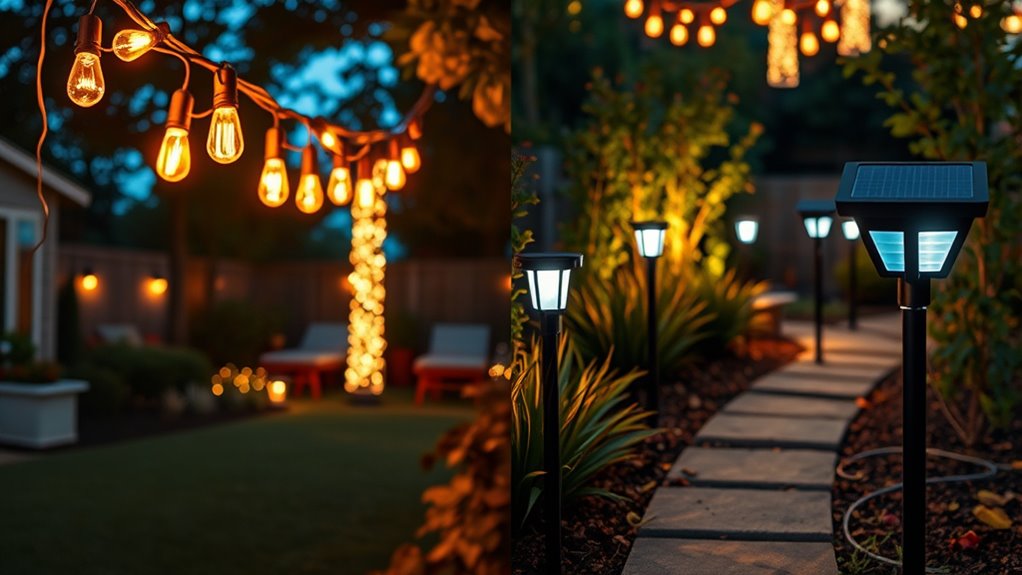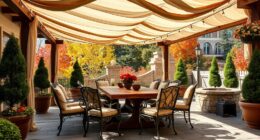Choosing between string lights and solar lights for your backyard depends on your needs. String lights are great for bright, consistent illumination and are usually easier to install near outlets. Solar lights are eco-friendly, cost-effective, and don’t require wiring, but their brightness and runtime depend on sunlight exposure. To make the best decision for your space, consider factors like installation, brightness, and weather. If you want to explore more options, keep going!
Key Takeaways
- Solar lights are eco-friendly, energy-efficient, and easy to install without wiring, ideal for quick backyard setups.
- Plug-in string lights offer brighter, more stable illumination, suitable for larger or high-traffic outdoor areas.
- Solar lights depend on sunlight, with performance affected by weather and placement; plug-in lights provide consistent brightness.
- Solar options have higher initial costs but lower ongoing energy expenses, while plug-in lights may incur higher electricity bills.
- Proper placement and regular cleaning of solar panels ensure optimal performance and sustainability in backyard lighting.

When choosing outdoor lighting, understanding the differences between string lights and solar lights can help you make an informed decision. Both options offer unique advantages, but knowing how they operate and what they require can guide you toward the best fit for your backyard. String lights come in two main types: solar-powered and plug-in. Solar string lights rely on sunlight to generate energy during the day, storing it in rechargeable batteries that power the LEDs at night. They turn on automatically at dusk thanks to built-in light sensors, requiring no manual operation or timers. This makes them convenient and energy-efficient, especially if you want to reduce your electricity bills and lower your carbon footprint. On the other hand, plug-in string lights depend on electrical outlets, providing consistent brightness regardless of weather or sunlight. They are often brighter and better suited for larger or high-traffic outdoor areas. However, their reliance on mains power means you might need professional installation to ensure safe outdoor wiring, and they don’t operate during power outages.
Choosing between solar and plug-in string lights depends on your outdoor space and energy preferences.
When it comes to installation, solar string lights are simpler. You don’t need any wiring or access to outlets; you just place the solar panels where they can get direct sunlight, such as a garden or patio. Many solar lights come with clips and stakes, making setup flexible and straightforward. In contrast, plug-in string lights require proximity to power outlets, which might limit placement options. If the area is shaded or less sunny, solar panels won’t function effectively, reducing performance. Solar panels need to be positioned in direct sunlight to maintain battery charge, so placement is key. For those seeking quick, hassle-free installation, solar lights are typically easier to set up.
Performance and brightness vary between the two options. Plug-in string lights generally produce a brighter and more stable light, making them ideal for larger spaces or areas with high foot traffic. Solar lights’ brightness and runtime depend heavily on sunlight exposure; cloudy days or short winter days can diminish their effectiveness. While both types use LED bulbs, solar lights tend to have less powerful illumination and may not last as long through the night. Regular cleaning of solar panels helps maintain their efficiency, but performance can decline if panels become dirty or obstructed. Solar panel efficiency can also be affected by dust, dirt, or debris, which is why periodic cleaning is recommended to keep them working optimally.
Cost and maintenance also differ. Solar lights often have a higher initial cost due to the solar panels but save money in the long run because they don’t consume electricity. They require minimal maintenance—mainly cleaning the panels—and batteries may need replacing after some years. Plug-in string lights might be cheaper initially but incur ongoing electricity costs and potential professional installation fees. They generally require less maintenance related to energy collection but should be inspected periodically for safety. Overall, solar lighting provides an eco-friendly, cost-effective solution, while plug-in options offer reliable, brighter illumination for more demanding outdoor spaces.
Frequently Asked Questions
Which Type of Lighting Is More Energy-Efficient?
You’re wondering which lighting type uses less energy. Solar lights are more efficient because they harness sunlight, store energy in batteries, and operate without grid power. They reduce electricity costs and environmental impact. While electric lights with LED bulbs are also energy-efficient, they rely on ongoing power from the grid. Overall, solar lights are the better choice if you’re aiming for maximum energy savings and eco-friendliness.
Can String Lights Be Used in Rainy Weather?
You wonder if string lights can brighten your rainy nights. If they have an IP65 rating or higher, they’re built to resist rain, splashes, and moisture, making them suitable outdoors. Choose weather-resistant materials like stainless steel or coated copper wire for durability. Always verify waterproof labels, avoid heavy rain exposure, and inspect regularly. With proper installation and maintenance, your string lights can safely illuminate your backyard even in wet weather.
How Long Do Solar Lights Typically Last?
You’re wondering how long solar lights last. Typically, the LED bulbs can shine for 10 years or more, while solar panels often last 25 to 35 years with proper care. Batteries usually need replacing every 3 to 5 years, depending on quality and use. If you maintain your lights well—cleaning panels and replacing batteries when needed—they can serve you well for many years.
Are There Safety Concerns With Outdoor String Lights?
You might wonder if outdoor string lights are safe, but there’s more at stake than just ambiance. Faulty wiring, overheating, or moisture exposure can ignite fires or cause electric shocks, especially if you ignore safety standards. Falls during installation pose serious risks, too. To stay safe, always use UL-listed, outdoor-rated lights, inspect for damage, and follow proper installation guidelines. A little caution now can prevent dangerous accidents later.
Do Solar Lights Require Special Installation Procedures?
You might wonder if solar lights need special installation procedures. The answer is yes; you should choose a location with plenty of direct sunlight, clear away debris, and secure the fixtures properly. Use the right tools, test the solar panel’s voltage, and guarantee cables are waterproof. Following the manufacturer’s instructions carefully helps maximize efficiency and safety, making sure your solar lights work well and last longer.
Conclusion
Ultimately, choosing between string lights and solar lights depends on what you value most in your backyard. If you want flexible, festive lighting, string lights are your go-to. But if eco-friendliness and energy savings matter more, solar lights are a smart choice. Remember, it’s all about finding the right fit for your space. Don’t put all your eggs in one basket—sometimes, a mix of both can truly make your backyard shine brighter than ever.









